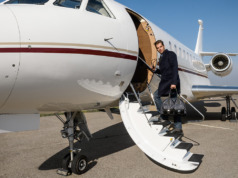
A s a fractional share owner, you don’t want to hear that your aircraft share value has diminished, especially as you exit the program.
If you’ve not recently reviewed your contract, you may be surprised to hear from your sales representative that the exit value is much lower than you expected. You may assume that an error was made, and the rep might gently suggest that you re-read what you signed.
When you do, you’ll find the term “Fair Market Value (FMV)” describing your exit value.
The American Society of Appraisers defines FMV as: “An opinion expressed in terms of money, at which the property would change hands between a willing buyer and a willing seller, neither being under any compulsion to buy or to sell and both having reasonable knowledge of relevant facts, as of a specific date.”
You might reasonably assume that the FMV of your aircraft share is comparable to the price of a share in an aircraft of comparable age. But most aircraft of a comparable age average fewer than 400 flight hours annually – fractional fleet aircraft average more than twice that. And most non-fractional aircraft are enrolled in an hourly cost maintenance program for engines and airframes. Fractional aircraft like yours are enrolled in a customized airline fleet maintenance program, and its current value likely is not comparable to that of non-fleet aircraft.
That means that the value of your aircraft share is comparable only to the value of other fractional fleet aircraft, not to all similar aircraft on the market. So instead of the “average of comparable sales” you might expect to define the value, it actually is based on some very specific criteria and assumptions about the aircraft’s condition.
FMV is an “offer” by the fractional company to you.
It is not an appraisal.
If the offer is not what you expected, how might you do better? Assuming you are leaving the program, you can:
- Sell your share to someone else, keeping the provider’s offer as a back up if you cannot find a better deal.
- Ask to arbitrate the price. The rules are spelled out in your contract. Be prepared with an aviation dictionary and $5,000 to have a certified appraiser complete a “desktop appraisal” (one based on the aircraft’s age, and total airframe and engine hours; no visual inspection is involved).
- Ask your attorney to write a letter expressing your displeasure. This option could cost you one or two additional months of management fees plus legal fees, just to tell your fractional provider that you are upset.
Arguing over FMV and exit penalties may be an unpleasant end to what otherwise was probably a good relationship and a safe flying experience. Avoid misunderstanding and disappointment by following these three tips:
- Read the contract carefully before you purchase, renew, or reinvest in a fractional share, to avoid any surprises when you leave. Be sure that the definition of “FMV” used by your fractional provider aligns with the ASA definition.
- Pay particular attention to the company’s return policy, and any possible penalties. Leaving the program before term end is never to your advantage, but may be necessary due to a change in your personal or business circumstances. Be prepared to pay the price for an early exit. And if you plan to re-up with the operator, use your newfound knowledge to negotiate better terms in your next contract.
- Once each year, ask your manager to send you a written estimate of your aircraft share value, and compare that to a current desktop appraisal. Recent market fluctuation and regulatory requirements could have a substantial negative impact on the value of your share.
Keeping abreast of these developments can help prevent “reverse sticker shock.” BAA
Above and Beyond: The BAA Podcast Series
Dan Dugger: Costly Assumptions
In this podcast, brought to you by JETNET, Dan Dugger of Canvas Aviation, and author of “Costly Assumptions” in our May/June issue tells business jet and turboprop fractional share owners how to avoid “reverse sticker shock.” Listen in, and find out what you need to know when you are ready to re-up, upgrade, or sell your fractional share.
Dan Dugger is President of Canvas Aviation. With 25 years in aviation, he was VP Sales for both NetJets and Marquis Jet. A Board member for JAARS, he is a commercially licensed private pilot.




